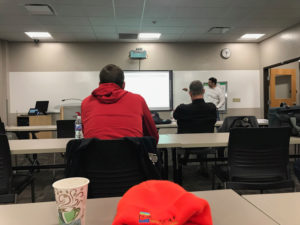UW-Extension, and more specifically the Dairy Team, are hosting the 2019 Cow College at the Fox Valley Technical College Regional Center in Clintonville, WI. A three-day course over the span of three week, focuses on a different topic of dairy farming. Each year the topics change, so it is not uncommon to attend multiple years of cow college.
Day 2 consisted of two presentation. The first speaker, Dr. Phil Cardoso, talked about the impacts of feeding amino acids on health, performance, and the fertility of dairy cows. Amber O’Brien, with UW-Extension, discussed improving dairy herd management with written protocols.
The group attending was slightly different than Day 1 but was full of people wanting to learn how to improve their cows.
Dr. Phil Cardoso, an associate professor of Animal Sciences at the University of Illinois Urbana-Champaign and Chicago Bears fan, started his presentation by asking the crowd their favorite NFL team. Unsurprising, he was the only one who voted for a team other than the Packers.
Again, with little knowledge in anything related to cows, Dr. Cardoso did a great job of explaining his work and his suggestions to improving the health of dairy cows. He discussed how important the dry matter intake is for a cow and how it can affect her ability to convince and reach a second or third lactation. Dr. Cardoso explained that a controlled energy diet, one where the intake of the cow is regulated, can be much more beneficial for a farm’s bottom line. Large swings in the weight of the cow, pre/post calving can affect how well that cow does in its next pregnancy/lactation. He was also able to show that the amino acid methionine is crucial in embryo development.
Slightly crunched for time, Amber O’Brien then discussed the importance of written protocols on the farm. With different groups working different shifts, having everyone following the same protocol can save time and help avoid emergencies. Protocols can be made for anything and everything. When the focus is on the cow, the vet and nutritionist should be involved. Good communication plus good protocols equal success.






